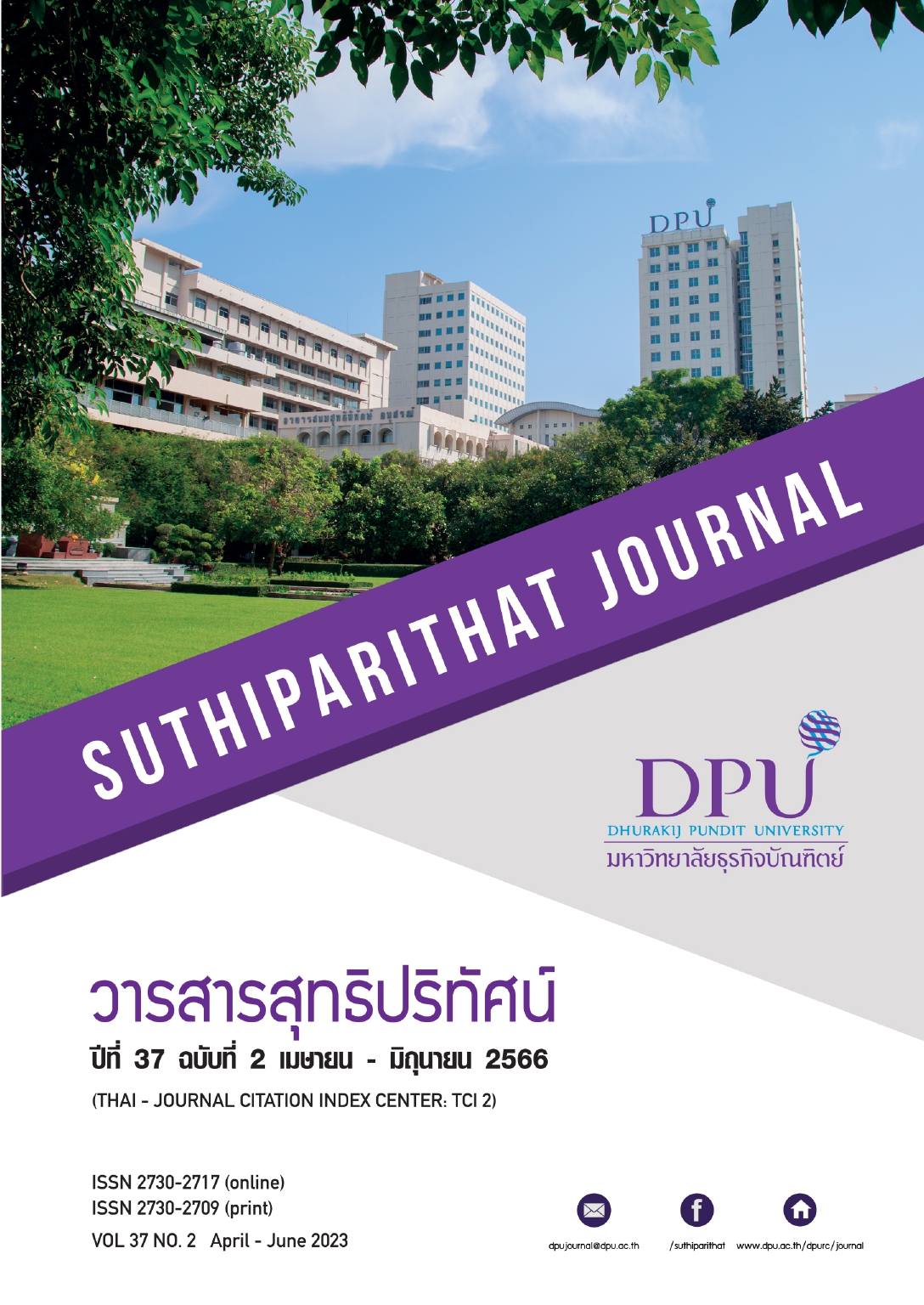อิทธิพลของความไม่แน่นอนของตลาดการเงินกับการใช้ประโยชน์ของข้อมูลทางบัญชีในการตัดสินใจลงทุน
คำสำคัญ:
ความไม่แน่นอนของตลาดการเงิน, ความเกี่ยวข้องกับการตัดสินใจ, ราคาหลักทรัพย์, ดัชนีตลาดหลักทรัพย์, ดัชนีพันธบัตรรัฐบาล, อัตราแลกเปลี่ยนบทคัดย่อ
งานวิจัยนี้มีวัตถุประสงค์เพื่อศึกษาอิทธิพลของความไม่แน่นอนทางของตลาดการเงิน ที่มีต่อนักลงทุนในการใช้ประโยชน์ของข้อมูลทางบัญชีในการตัดสินใจลงทุนในประเทศไทย โดยใช้ตัวแบบจำลองการวัดมูลค่าของ Ohlson (1995) การศึกษานี้เป็นการวิจัยเชิงประจักษ์โดยใช้วิธีการวิเคราะห์การถดถอยเชิงพหุคูณ เก็บรวบรวมข้อมูลความไม่แน่นอนของตลาดการเงินในช่วงระยะเวลาตั้งแต่ปี 2554 ถึง 2562 และรวบรวมข้อมูลจากบริษัทจดทะเบียนในตลาดหลักทรัพย์แห่งประเทศไทย กลุ่มของ SET100 ผลการศึกษาพบว่า ความไม่แน่นอนของตลาดการเงิน มีอิทธิพลต่อการใช้ข้อมูลทางบัญชีเพื่อประโยชน์ในการตัดสินใจลงทุนเพิ่มมากขึ้น โดยมีความผันผวนของดัชนีตลาดหลักทรัพย์เป็นปัจจัยที่มีอิทธิพลที่ทำให้มีการใช้ข้อมูลทางบัญชีเพื่อประโยชน์ในการตัดสินใจลงทุนของนักลงทุนเพิ่มขึ้นเมื่อเกิดความไม่แน่นอนของตลาดการเงิน ในขณะที่ความผันผวนของตลาดการเงินในปัจจัยตัวอื่น ได้แก่ ดัชนีพันธบัตรรัฐบาล อัตราดอกเบี้ยพันธบัตรรัฐบาล และอัตราแลกเปลี่ยนเงินดอลลาร์สหรัฐต่อเงินบาท ไม่มีอิทธิพลอย่างมีนัยสำคัญต่อระดับการใช้ข้อมูลทางบัญชีเพื่อประโยชน์ในการตัดสินใจลงทุนของนักลงทุน นอกจากนั้นยังพบว่า ความสามารถในการอธิบายราคาหลักทรัพย์ของข้อมูลทางบัญชีมีผลเพิ่มขึ้นเพียงเล็กน้อยจากผลกระทบของความไม่แน่นอนของตลาดการเงิน อย่างไรก็ตาม ในปีที่ดัชนีตลาดหลักทรัพย์หรืออัตราดอกเบี้ยพันธบัตรรัฐบาลมีความผันผวนสูง ความสามารถในการอธิบายราคาหลักทรัพย์ของข้อมูลทางบัญชีจะเพิ่มขึ้นมากกว่าปีอื่นๆ ซึ่งแสดงให้เห็นว่าผู้ลงทุนให้ความสำคัญกับการใช้ข้อมูลทางการบัญชีในการตัดสินใจลงทุนในตลาดหุ้นเสมอไม่ว่าตลาดการเงินจะมีความไม่แน่นอนในรูปแบบใด
เอกสารอ้างอิง
อนุวัฒน์ ภักดี, และ ศิลปพร ศรีจั่นเพชร. (2563). ความเกี่ยวข้องของข้อมูลบัญชีกับราคาหลักทรัพย์ในกลุ่มอุตสาหกรรมธุรกิจการเงิน: มุมมอง 15 ปี. วารสารวิชาการบริหารธุรกิจสมาคมสถาบันอุดมศึกษาเอกชนแห่งประเทศไทยในพระราชูปถัมภ์ สมเด็จพระเทพรัตนราชสุดาฯ สยามบรมราชกุมารี, 9(1), 196-214. https://so02.tci-thaijo.org/index.php/apheitvu/article/view/242893/164730
Acaranupong, K. (2017). Comparative value relevance of earnings, book values and cash flows: Empirical evidence from listed companies on SET100 in Thailand. Journal of Accounting Professional, 13(38), 97-114. http://www.jap.tbs.tu.ac.th/files/Article/Jap38/Full/Jap38Kittima.pdf
Açık, A., Ayaz, İ., & Baran Kasapoglu, E. (2020). Exchange rate and stock price interactions: An evidence from Turkish transportation section. Mehmet Akif Ersoy University Journal of Social Sciences Institute, 31, 109-119. https://doi.org/10.20875/makusobed.469158
Adwan, S., & Alhaj-Ismail, A., & Girardone, C. (2020). Fair value accounting and value relevance of equity book value and net income for European financial firms during the crisis. Journal of International Accounting, Auditing and Taxation, 39. https://doi.org/10.1016/j.intaccaudtax.2020.100320
Ali, A., & Hwang, L.-S. (2000). Country-specific factors related to financial reporting and the value relevance of accounting data. Journal of Accounting Research, 38(1), 1–21. https://doi.org/10.2307/2672920
Amir, E., Harris, T. S., & Venuti, E. K. (1993). A comparison of the value-relevance of U.S. Versus Non-U.S. GAAP accounting measures using form 20-F reconciliations. Journal of Accounting Research, 31, 230–264. https://doi.org/10.2307/2491172
Anisha, & Khera, A. (2020). Relationship analysis of stocks prices and exchange rates of three leading Asian economies. Theoretical and Applied Economics, Asociatia Generala a Economistilor din Romania - AGER, 3(624), 179-192. http://store.ectap.ro/articole/1481.pdf
Belmont, D. P. (2004). Value added risk management in financial institutions. John Wiley & Sons (Asia).
Bilgic, F. A., Ho, S., Hodgson, A., & Xiong, Z. (2018). Do macro-economic crises determine accounting value relevance? Accounting in Europe, 15(3), 402-422. https://doi.org/10.1080/17449480.2018.1514123
Cahan, S. F., Emanuel, D., & Sun, J. (2009). The effect of earnings quality and country-level institutions on the value relevance of earnings. Review of Quantitative Finance and Accounting, 33(4), 371-391. https://doi.org/10.1007/s11156-009-0117-z
Cao, G. (2012). Time-varying effects of changes in the interest rate and the RMB exchange rate on the Stock Market of China: Evidence from the long-memory TVP-VAR model. Emerging Markets Finance & Trade, 48, 230-248. http://www.jstor.org/stable/41739227
Dal Maso, L., Liberatore, G., & Mazzi, F. (2016). Value relevance of stakeholder engagement: The influence of national culture. Corporate Social Responsibility and Environmental Management, 24(1), 44-56. https://doi.org/10.1002/csr.1390
Graham, R. C., Morrill, C., & Morrill, J. (2005). The value relevance of accounting under political uncertainty: Evidence related to Quebec's independence movement. Journal of International Financial Management & Accounting, 16(1), 49-68. https://doi.org/10.1111/j.1467-646X.2005.00111.x
Graham, R., King, R., & Bailes, J. (2000). The value relevance of accounting information during a financial crisis: Thailand and the 1997 decline in the value of the baht. Journal of International Financial Management and Accounting, 11(2), 84-101. https://doi.org/10.1111/1467-646X.00057
Loudon G. (2017). The impact of global financial market uncertainty on the risk-return relation in the stock markets of G7 countries. Studies in Economics and Finance, 34(1), 2-23. https://doi.org/10.1108/SEF-05-2013-0069
Moradi, M., Appolloni, A., Zimon, G., Tarighi, H., & Kamali, M. (2021). Macroeconomic factors and stock price crash risk: Do managers withhold bad news in the crisis-ridden Iran market?. Sustainability, MDPI, 13(7), 1-16. https://doi.org/10.3390/su13073688
Ohlson, J. A. (1995). Earnings, book values, and dividends in equity valuation. Contemporary Accounting Research, 11(2), 661-687. https://doi.org/10.1111/j.1911-3846.1995.tb00461.x
Ozyesil, M. (2020). Investigation of the relationship between economic and political uncertainty and general economic outlook: An econometric analysis on Athens Stock Exchange. Adam Academy Journal of Social
Sciences, 10(1), 73-104 https://doi.org/10.31679/adamakademi.686464
Phiri, A. (2020). Structural changes in exchange rate-stock returns dynamics in South Africa: Examining the role of crisis and new trading platform. Economic Change & Restructuring, 53(1),171-193. https://doi.org/10.1007/s10644-019-09246-8
Reboredo, J. C., & Naifar, N. (2017). Do Islamic Bond (Sukuk) prices reflect financial and policy uncertainty? A quantile regression approach. Emerging Markets Finance and Trade, 53(7), 1535-1546. https://doi.org/10.1080/1540496X.2016.1256197
Sonjai, S. (2016). Measuring economic impact of political protest by using the Global Database of Events Languages and Tone (GDELT) [Master’s thesis, Chulalongkorn University]. The Bachelor of Arts Program in Economics, Faculty of Economics, Chulalongkorn University http://www.eba.econ.chula.ac.th/files/upload/files/research/5645919229%20Sirirut%20Sonjai.pdf
Taveeapiradeecharoen, P., & Aunsri, N. (2020). A Bayesian approach for dynamic variation of specific sectors in stock exchange: A case study of Stock Exchange Thailand (SET) Indexes. Wireless Personal Communications, 115, 2995–3032. https://doi.org/10.1007/s11277-020-07217-1
Ürkmez, E., & Bölükbaşı, Ö. F. (2021). The impact of exchange rates of stock prices for Turkey: An asymmetric non-linear cointegration analysis. Marmara Üniversitesi İktisadi ve İdari Bilimler Dergisi, 43(1), 42-56. https://doi.org/10.14780/muiibd.960267
ดาวน์โหลด
เผยแพร่แล้ว
รูปแบบการอ้างอิง
ฉบับ
ประเภทบทความ
สัญญาอนุญาต
ลิขสิทธิ์ (c) 2023 มหาวิทยาลัยธุรกิจบัณฑิตย์

อนุญาตภายใต้เงื่อนไข Creative Commons Attribution-NonCommercial-NoDerivatives 4.0 International License.
เนื้อหาและข้อมูลในบทความที่ลงตีพิมพ์ในวารสารสุทธิปริทัศน์ ถือเป็นข้อคิดเห็นและความรับผิดชอบของผู้เขียนบทความโดยตรงซึ่งกองบรรณาธิการวารสาร ไม่จำเป็นต้องเห็นด้วย หรือร่วมรับผิดชอบใด ๆ
บทความ ข้อมูล เนื้อหา รูปภาพ ฯลฯ ที่ได้รับการตีพิมพ์ในวารสารสุทธิปริทัศน์ ถือเป็นลิขสิทธิ์ของวารสารสุทธิปริทัศน์หากบุคคลหรือหน่วยงานใดต้องการนำทั้งหมดหรือส่วนหนึ่งส่วนใดไปเผยแพร่ต่อหรือเพื่อกระทำการใด ๆ จะต้องได้รับอนุญาตเป็นลายลักษณ์อักษรจากวารสารสุทธิปริทัศน์ก่อนเท่านั้น







